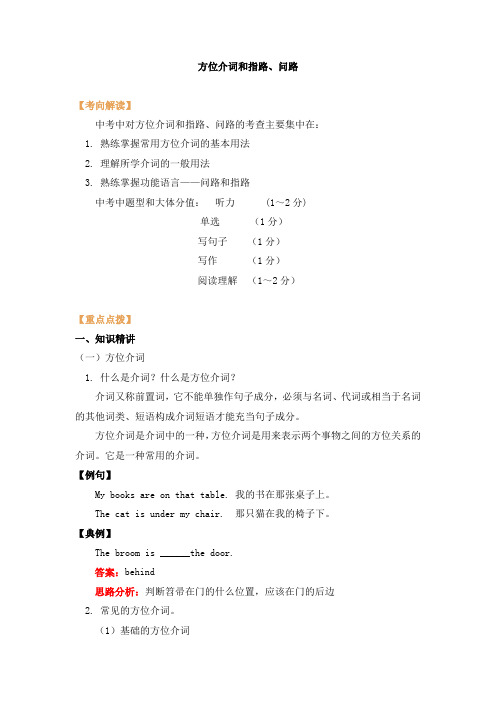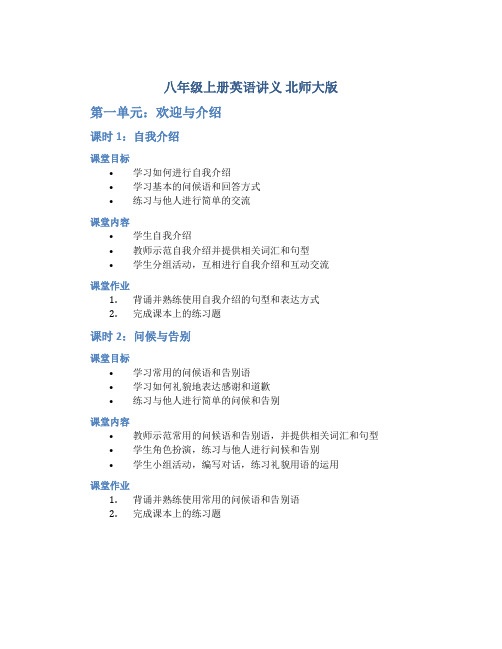初二年级英语讲义
英语八年级上册知识讲义 方位介词和指路、问路

方位介词和指路、问路【考向解读】中考中对方位介词和指路、问路的考查主要集中在:1. 熟练掌握常用方位介词的基本用法2. 理解所学介词的一般用法3. 熟练掌握功能语言——问路和指路中考中题型和大体分值:听力 (1~2分)单选(1分)写句子(1分)写作(1分)阅读理解(1~2分)【重点点拨】一、知识精讲(一)方位介词1. 什么是介词?什么是方位介词?介词又称前置词,它不能单独作句子成分,必须与名词、代词或相当于名词的其他词类、短语构成介词短语才能充当句子成分。
方位介词是介词中的一种,方位介词是用来表示两个事物之间的方位关系的介词。
它是一种常用的介词。
【例句】My books are on that table. 我的书在那张桌子上。
The cat is under my chair. 那只猫在我的椅子下。
【典例】The broom is ______the door.答案:behind思路分析:判断笤帚在门的什么位置,应该在门的后边2. 常见的方位介词。
(1)基础的方位介词方位介词意思和用法例句on 表示在某物的上面,指与某物体相接触。
The picture is on the wall. 那张图片挂在墙上。
under 表示在某物垂直的正下方,两者之间不接触The book is under the desk. 那本书在桌子下。
behind 表示在某物的后面There is a tree behind thehouse.房子后面有棵树。
in 表示在场所、地点或位置里,意为“在……之内”、“在……里面”Your pencil is in the pencil-box.你的铅笔在铅笔盒里。
In front of 表示“在……的前面”,与 behind恰好相反My brother stands in front of mymother.我弟弟站在我妈妈的前面。
near 表示在某物的附近,意为“接近,靠近”Our school is near the lake. 我们的学校位于湖畔。
八年级英语一对一学科教师辅导讲义

重点、难点:
动词不定式to do的用法
【课前过关】:U5单词听写
【入门测】:汉译英。
1.我很抱歉听到这个(表示对发生的不好的事感到同情或惋惜)
_____________________________________________.
2.有什么问题吗?
_____________________________________________.
注意区分复合形容词three-day与名词短语three days.复合形容词three-day, two-month, four-year-old等只能作定语修饰名词。
练习:He is only___________________________(一个三岁的男孩).
2.It will take us a few days to get there by bike.译:____________________________________
They invite me to go to Paris with them._______________________________________
You can ask them to wear short coats and slim pants._______________________________________
I think the most exciting way isto sell flowers in the evening.
Your group’s task is to find out the cost to go by train.
(4)做定语:可以用来修饰人和物,放在被修饰词后面。
人教新目标英语八年级下册讲义—Unit 6 An old man tried to move ……

新目标八年级下册Unit6 An old man tried to move the mountains.讲义一、词性转换Section A1. shoot →(pt.) shot2. remind →(pt.) reminded3. hide→(pt.) hid4.excite→(adj.) exciting/excited5.fit →(pt.) fit6.marry →(pt.) married Section B7.cheat →(n.) cheat8.wife →(pl.) wives9.shine →(pt.) shone10.lead →(pt.) led11.brave →(adv.) bravely二、短语归纳1. work on doing sth.致力于做某事2. as soon as ...一……就……3. once upon a time 从前4. continue to do sth.继续做某事5. make sth. happen使某事发生6.try to do sth. 试图做某事7. the journey to sp. ……之旅8. tell the/a story 讲故事9. put on 穿上10. a little bit 有点儿11. keep doing sth.坚持做某事12. give up 放弃13. instead of 代替;反而14. turn .. . into 变成15. get married 结婚16. the main character主要人物;主人公17. at other times在另外一些时候18. be able to 能;会19. come out (书/电影等)出版20. become interested in.对……感兴趣21. walk to the other side走到另一边去22. a fairy tale 一个神话故事23. the rest of the story故事的其余部分24. leave sb. to do sth.让某人做某事25. make a plan to do sth.筹划/计划做某事26. go to sleep 去睡觉27. lead sb. to sp.把某人领到某地28. get lost 迷路29. change one’s plan改变计划30. tell sb. to do sth.叫某人做某事31. in the moonlight 在月光下32. find one’ s way home找到某人回家的路33. the next day 第二天34. send sb. to sp.派某人去某地35. so... that如此……以至于……三、句型集萃1. try to do sth. 设法做某事2. finish doing sth. 完成做某事3. continue to do sth. 继续做某事4. keep doing sth. 一直做某事5. be able to do sth. 能够做某事6. make sb. do sth. 让某人做某事7. instead of doing sth. 代替做某事8. become interested in doing sth.对做某事感兴趣9. can’t stop doing sth. 禁不住做某事10. hear sb. doing sth. 听见某人正在做某事11. lead sb. to sp. 带领某人去某地12. leave sth. at/in sp. 把某物遗忘在某地13. have on time to do sth. 没有时间做某事14. show sb. sth. 向某人展示某物15. love doing sth. 喜欢做某事四、重点句子1. A man told yu Gong that he could never do it. 一个人告诉愚公他绝不可能把山移走。
八年级上册英语u1-u2讲义

⼋年级上册英语u1-u2讲义Unit 1 How often do you exercise?重点词组:1.how often多久⼀次2.go skateboarding去参加滑板运动3.do some reading阅读(do somecleaning/cooking/washing)4.do/take some exercise锻炼=play sports5.go to the movies=go to the films去看电影6.hardly ever ⼏乎不曾7.every day每天8.once a week⼀周⼀次9.twice a month ⼀个⽉两次10.three times a year⼀年三次11.three or four times a day⼀天三四次12.his favorite program他最喜欢的节⽬13.surf the Internet⽹上冲浪chat with others on the Internet ⽹上聊天14.student activity survey学⽣活动调查15.most students=most of the students⼤多数的学⽣16.the results of………的结果17.as for⾄于18.improve your English提⾼你的英语19.eat junk food吃垃圾⾷品20.drink milk/coffee喝⽜奶/咖啡21.want sb. to do sth.=would like sb. to do sth.想让某⼈去做某事22.be good for对…有益---be bad for对…有害23.sleep nine hours every night每晚睡九⼩时/doc/17141661caaedd3383c4d393.html e home from school从学校来到家⾥25.eating habits饮⾷习惯26.try toeat a lot of vegetables尽量吃⼤量的蔬菜(a lot of=lots of=many+可数名词的复数=much+不可数名词)27.ofcourse=certainly=sure当然28.look after=take care of照顾,关⼼29.have a healthy lifestyle拥有健康的⽣活⽅式30.get good grades 取得好成绩31.help sb (to) do sth帮助某⼈做某事32.study better学得更好33.kind of unhealthy有点不太健康34.be the same as与…相同----be different from与…不同35.the differences between A and B A和B之间的区别,差异36.keephealthy=stay healthy=keep/be in good health保持健康37.keep doing sth⼀直或持续做某事38.look the same看起来⼀样look different看起来不同重点句⼦:1.你多久锻炼⼀次?我每周锻炼三四次。
八年级上册英语讲义 北师大版

八年级上册英语讲义北师大版第一单元:欢迎与介绍课时1:自我介绍课堂目标•学习如何进行自我介绍•学习基本的问候语和回答方式•练习与他人进行简单的交流课堂内容•学生自我介绍•教师示范自我介绍并提供相关词汇和句型•学生分组活动,互相进行自我介绍和互动交流课堂作业1.背诵并熟练使用自我介绍的句型和表达方式2.完成课本上的练习题课时2:问候与告别课堂目标•学习常用的问候语和告别语•学习如何礼貌地表达感谢和道歉•练习与他人进行简单的问候和告别课堂内容•教师示范常用的问候语和告别语,并提供相关词汇和句型•学生角色扮演,练习与他人进行问候和告别•学生小组活动,编写对话,练习礼貌用语的运用课堂作业1.背诵并熟练使用常用的问候语和告别语2.完成课本上的练习题第二单元:家庭与朋友课时1:家庭成员课堂目标•学习家庭成员的英文表达•学习如何用英语描述家庭关系•练习运用所学内容进行口语表达课堂内容•学生一一介绍自己的家庭成员•教师示范描述家庭成员的表达方式,并提供相关词汇和句型•学生小组活动,练习描述家庭关系,进行口语交流课堂作业1.背诵并熟练使用家庭成员的英文表达2.完成课本上的练习题课时2:朋友课堂目标•学习如何用英语描述朋友的特点和爱好•学习如何用英语表达友谊和感谢•练习与他人进行简单的口语交流课堂内容•学生介绍自己的朋友,并描述他们的特点和爱好•教师示范描述朋友的特点和爱好,并提供相关词汇和句型•学生小组活动,练习描述朋友以及表达友谊和感谢课堂作业1.背诵并熟练使用描述朋友的句型和表达方式2.完成课本上的练习题第三单元:学校生活课时1:校园规则课堂目标•学习学校规则的英文表达•学习如何礼貌地表达请求和建议•练习运用所学内容进行口语表达课堂内容•学生讨论并总结学校的规则•教师示范表达请求和建议的句子,并提供相关词汇和句型•学生小组活动,练习礼貌地表达请求和建议课堂作业1.背诵并熟练使用学校规则的英文表达2.完成课本上的练习题课时2:学校活动课堂目标•学习如何用英语描述学校活动•学习如何用英语表达自己的兴趣和参与意愿•练习与他人进行简单的口语交流课堂内容•学生介绍自己参与过的学校活动•教师示范描述学校活动的表达方式,并提供相关词汇和句型•学生小组活动,练习描述学校活动以及表达兴趣和参与意愿课堂作业1.背诵并熟练使用描述学校活动的句型和表达方式2.完成课本上的练习题通过以上的讲义,学生可以系统地学习和提高英语口语表达能力。
初二英语同步辅导讲义

初二英语同步辅导讲义Unit 2 What are you going to do ?主要内容:1.词汇fifth, trip, field, trip, fish, fishing, go fishing, east , boating, go boating, maybe, mountain, hike, hiking, go hiking, agree, picnic, the day after tomorrow, top, problem, quick, quickly, start, trip, trip over, tire, hurry, hurry up, tie, die, more, city, take, eighth, salesgirl, far, beautiful2.日常交际用语Let's discuss it.Are we all going?I like go fishing.Let's go boating on the river.That' s going to be fun.I agree.3.语法be going to 句型“ be going to+动词原形”表示将要发生的事,或打算、计划、决定要做某事。
常与表示将来的时间连用。
如:tomorrow, tomorrow morning/afternoon/evening, this evening, next week/month/year 等。
be 是助动词, 随着主语的人称和数的变化而变化。
否定句在be后加not, —般疑问句将be放句首大写。
例如:I am going to have a swim tomorrow. 我打算明天去游泳。
They aren't going go have any lessons next week. 他们下星期不上课。
Is Li Lei going to play basketball after school ? 李雷打算放学后去打蓝球吗?—Where are you going to meet ? 你们打算在哪儿见面?—On the road outside the school gate. 在校门口的马路上。
八年级英语下册知识讲义(Unit 6 Enjoying Cycling Topic3 .)-仁爱版
知识梳理二、重点单词【单词学习】1. notice v.看(或听)到,注意到n. 注意,理会notice作感官动词时,可接不带to的不定式,也可接doing作宾语补足语。
(1)notice sb. do sth. 意为“注意到某人做了某事”。
I noticed them run every morning. 我注意到他们每天早上跑步。
(强调过程)(2)notice sb. doing sth. 意为“注意到某人正在做某事”。
I noticed the boy reading in the classroom.我注意到这个男孩正在教室里读书。
(强调状态)在中考中,重点考查notice作动词时的用法,即:notice sb. do sth. 和notice sb. doing sth.notice作名词,也可表示“通知,布告,启事”的意思。
The notice on the wall says “No Smoking”. 墙上的告示写着“请勿吸烟”。
Do you notice a girl _________ in the next room?A. singsB. singingC. to singD. sang答案:B思路分析:本题重点考查词组notice sb. doing sth.,表示“注意到某人正在做某事”的意思。
根据句意“你注意到那个女孩正在隔壁房间唱歌吗?”故选B。
2. cover v. 包括,包含;涉及cover作动词时,意为“包括,包含;涉及”,后接名词或名词短语。
The survey covers all aspects of the business. 调查涉及这家企业的各个方面。
在中考中,重点考查cover的基本用法和固定搭配词组be covered with sth. 被……覆盖着。
(1)cover还可以表示距离,意为“行走(一段路程)”We covered thirty miles yesterday. 昨天我们走了三十英里。
仁爱英语8年级上册U1Topic1学科讲义(有答案)
知识点击:Section A1.I often sawyou play basketball during the summer holiday。
see sb do sth、意为“看见某人做某事”,表示看见事件、行动的全过程,强调动作已经结束、Eg:He saw her cross the road。
他看见他过了马路。
see sbdoing sth、意为“看到某人正在做某事”,强调事件、行动正在进行。
Eg: I saw her dancing at this time yesterday、我看到她昨天这个时间在跳舞、类似用法的动词还有watch,hear, smell, feel,listento等。
练习:(1) Do yousmellsomething?(burn) 答案:burning(2) Ioftenseehim basketball after class、(play)答案:play2、Would you like to e and cheer us on?----- Sure, I'dloveto。
(1)Wouldyoulike + 不定式+其他?表建议或邀请。
常用I’dlove to来回答,不同意也常用“I’d love to, but… "来拒绝别人。
如:Would you liketo playbasketball with me ?--—I’d love to, but I havea lot of homework to do。
(2)在肯定句中would like= want如: I’dlike tohavearest、= Iwantto have a rest。
注意:cheer sbon 为“为某人加油,向某人欢呼"的意思cheer sbup 使某人快乐/振奋起来Eg:Our friends will cheer us on、我们的朋友会为我们加油的。
八年级下册英语第一单元讲义
Unit 1 What’s the matter?第一部分:重点语法讲解:1. Should 用法:should 是情态动词词,意思是“应该,应当”表示劝告,建议或命令。
没有人称和数的变化形式,后面接动词原形。
(1)You should drink much water.(2)否定句: You should not drink much water.(3)—It’s cold outside. Should I close the window?—Yes, you should. No, you should not.2. 我们学到的用英语提建议的句型还有:(1) Shall I /we +do sth ?(2) Let’s do sth.(3) What/how about doing sth?(4) Why not do sth= Why don’t you do sth ?(5) You’d/ we’d better (not )do sth?3. 跟踪练习题一.单项选择:1. —_________ we go to visit the Great Wall tomorrow?—Good idea.A. ShallB. WillC. MustD. May2. Let’s __________ a party this Sunday at school.A. to haveB. haveC. havingD. had3. What __________helping her with her English?A. toB. ofC. aboutD. finish4. Why not ___________ your homework on time?A. to finishB. finishingC. finishedD. finish5. If you have a headache, I think you __________ see a doctor.A. willB. shallC. shouldD. can二.按要求改写句子,每空一词。
仁爱英语八年级U3T2综合复习讲义
Unit 3Topic 2 What sweet music!重点短语、句型复习短语:1.去听音乐会2.在音乐会上3.多么遗憾啊!4.借给某人某物5.举办音乐会6.多么令人激动!7.乐器8.度过一个美好的夜晚9.弹吉他/拉小提琴/弹钢琴/打鼓10.在业余时间11.讨厌做某事12.更喜欢/最喜欢13.一般般14.来去匆匆15.日常生活16.受某人欢迎17.劳动人民18.因......而出名19.出生20.在某人几岁时21.结束22.走向23.决定做某事24.让某人开心25.心灵的舒适和宁静26.教某人做某事句型:1. --What are you going to do this Sunday evening?--星期天晚上你打算做什么?2.--Why not come with me?--和我一起来怎么样?3.--What kind of music do you like?--It’s hard to say.--你喜欢哪种音乐? --很难说。
4.Pop music often comes and goes quickly.流行音乐通常来得快去的快。
5. They are very popular with young people.它们非常受年轻人的欢迎。
6. Everyone loves music but different people have different tastes.每个人都喜欢音乐,但是不同的人有不同的口味。
7. Good music brings people comfort and peace of mind.好的音乐带给人们舒适和心灵的宁静。
8. I can lend you some CDs of her songs.我可以借给你一些她的歌曲光盘。
9. Soon he played as well as his elder sister.很快他弹得跟他姐姐一样好。
- 1、下载文档前请自行甄别文档内容的完整性,平台不提供额外的编辑、内容补充、找答案等附加服务。
- 2、"仅部分预览"的文档,不可在线预览部分如存在完整性等问题,可反馈申请退款(可完整预览的文档不适用该条件!)。
- 3、如文档侵犯您的权益,请联系客服反馈,我们会尽快为您处理(人工客服工作时间:9:00-18:30)。
一、同步知识拓展词汇Words1. fitness n. 健康;合格e. g. Now, how are you going to shape your lifestyle to improve your fitness?现在,你如何来塑造自己的生活方式,提高您的健身呢?I'm trying to improve my fitness by cycling to work.我设法通过骑车上班来提高健康状况。
【词性拓展】fit n. 合身;发作;痉挛adj. 健康的;合适的;反义词为unfitvt&vi 安装;使适应;适合【词汇拓展】be fit for 适合(于),对……合适;胜任fitness equipment 健身器材fitness center 健身中心fitness camp 健身训练营fitness test 健康检查批注:词汇联想记忆法。
由healthy联想到fit,两者意思相当且常出现在选择题的同义词替换中。
2. fail vt.&vi. 失败;不及格;未能e. g. He failed( = didn't pass)his English examination. 他的英语考试不及格。
The boys tried to climb the mountain, but they failed because of the bad weather.孩子们尽力想爬上山,但天气不好没成功。
【词性拓展】failure n.失败【词汇拓展】fail to do sth. 未能做某事=be not able to do sth.=not do sth. =not manage to do sth.批注:fail与failur转换会在考题中的词性转换中出现,且二者之间的转换是一个高频考点。
3. upset adj. 心烦的;苦恼的vt.&vi. (使)心烦意乱;弄翻e. g. Mother will be upset if we don't let her know where we are.我们要是不让妈妈知道我们在哪里,她会放心不下。
I upset the soup all over the table. 我把汤打翻在桌子上。
John_______ _______ many sit-ups to keep fit.3. Maria can jump higher than Rose. (保持句子原意)Rose can't jump _________ _________ _________ Maria.4. I haven't been to America. Neither have my parents. (保持句子原意)I haven't been to America. My parents haven't, ___________.5. He doesn't need to do much exercise. (改为肯定句)He_______ _______ do much exercise.Keys: 1-5 didn’t she; doesn’t do; as high as; either; needs to一、专题语法提升I.Choose the best answers.(20分)( ) 1.My cousin has a small garden many beautiful flowers.A. ofB. withC. aboutD. in( ) 2.This is an old house and there are only some pieces of furniture(家具) in it.A. woodB. woodsC. woodenD. woodenly ( ) 3.My flat in Shanghai is different yours in Beijing in some ways.A. onB. fromC. forD. in( ) 4.Would you please give me drink? I'm thirsty. Anything will do.A. manyB. anyC. someD. other( ) st summer, people planted __________ trees to make our city greener and more beautiful.A. five millionsB. five millions ofC. five millionD. five million of ( ) 6.The room is a room where you can eat meals.A. sitting roomB. living roomC. dining roomD. bedroom( ) 7.Friday is the day of a week.A. sixthB. lastC. fifthD. first( ) 8.The river is .A.150-metre longB.150 meters longC. long 150 metersD. long 150-metre ( ) 9.There is an air conditioner the window in the room.A. inB. atC. aboveD. between( ) 10.---Hello. Who __________? ---__________ Kitty speaking.A. are you; I amB. is that; This isC. are you; This isD. is this; It’s( ) 11.Please listen to the teacher carefully. Don’t __________ the window.A. look toB. look atC. look intoD. look out of ( )12.The Greens often relax (休憩) in the __________ and watch exciting films.A. bedroomB. kitchenC. sitting roomD. bathroom ( )13.San has his __________ cows and sheep (牛羊). He is the __________ of a farm.age," answered the woman. The Chinese felt very _____5_____. He didn't know why. Can you help him?Choose the word or expression and complete the passage:()1. A. birthday B. holidays C. New Year D. money()2. A. make B. making C. having D. find()3. A. OK B. hello C. sorry D. good-bye()4. A. What B. Who C. How D. How old()5. A. sad B. tired C. surprised D. disappointedⅣ. Read the passage and fill in the blanks with the proper words. (在短文的空格内填入恰当的词,使其内容通顺,每空格限填一词,首字母已给):(共5分)The city of Hangzhou is in the south-east of China. It is f 1for its beautiful West Lake with a long history. I2 you come to Hangzhou, you will see many p3 with beautiful flowers and trees and places around the West Lake. So it is not s4 that many visitors come to Hangzhou for s5, shopping and fun.1.f__________2.I__________3.p__________4.s__________5.s__________Keys:I. 1-5 BCBCC 6-10 CABDB 11-15 DABCC 16-20 BDBBDII. 1. interesting 2. different 3. decided 4. competition 5. visitors6. snacks7. interested8. suggestions9. tourists 10. WriterIII.1.haven’t yet 2.Have been 3.Where go 4.When will 5.What doIV. 1. famous 2. If 3. parks 4. surprising 5. sightseeingV.1.B 2. A 3.B 4.D 5. CⅣ. Read the passage and fill in the blanks with the proper words. (在短文的空格内填入恰当的词,使其内容通顺,每空格限填一词,首字母已给):(共6分)At different times in a man’s life, his food has different effects (影响) on his body. Among children, food is q1 . changed to the power to run and play games. Most of a young man's food is spent g2 tall, we grow upwards (向上地)only d3 the first twenty years of our life, not later. Working men get their strong bodies from their food; and if they work h4 , they do not get fat. Office workers eat well and sit down a lot, and may begin to grow fat when they are still q5 young. Many older people try to work much and walk often. Perhaps the most difficult time is when a man r6 sixty years old. His body and mind become restful, without much work or interest.V. 1 quickly 2. growing 3. during 4. hard 5. quite 6. reaches学法升华。
